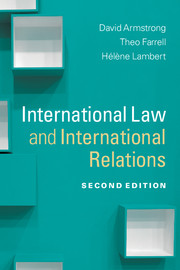9 - Law and power in an evolving world order
from Part III - Conclusions
Published online by Cambridge University Press: 05 June 2012
Summary
In our Introduction to this book, we asserted that international law matters more now than ever before. In our historical discussion in Chapter 2 we also suggested that global or regional power structures have always been a major determinant of the content and efficacy of international law. The last twenty years has witnessed a complex interaction between the dynamics created by these two factors, while potentially fundamental changes in the global balance of power will ensure that it may be some decades before a clear and enduring outcome of this interaction is in sight. Up to the time of the global economic collapse of 2007–2008 most predictions would have been based on assumptions about the continuing supremacy of the United States (US). The collapse of the Soviet Union in 1991 had left the world with only one superpower. What was quickly recognised to be a ‘unipolar moment’ in world history was predicted as leading towards a unipolar age. The concentration of economic, military and political power in the US was seen as so great that no rival power could rise, nor counter-balancing alliance emerge, for the foreseeable future. Indeed, it became common to speak of US hegemony in imperial terms. Hence Joseph Nye noted in 2003: ‘the world “empire” has come out of the closet. Respected analysts on both the left and the right are beginning to refer to “American empire” approvingly as the dominant narrative of the 21st century.’ This view of the US was shared across the world. As one Russian specialist observed, ‘whether or not the US now views itself as an empire, for many foreigners it increasingly looks, walks and talks like one, and they respond to Washington accordingly’.
This hegemonic US often appeared to show scant regard for international law. It opposed major multilateral treaties on nuclear testing, landmines, climate change, biological diversity, law of the sea and the International Criminal Court (ICC), all of which were supported by most other states. More dramatically still, the controversial US invasion of Iraq in 2003 without a clear mandate from the United Nations Security Council (UNSC) was widely pointed to as evidence of actual US lawlessness. The picture that emerged was one of an unbound US pushing its weight around the world.
- Type
- Chapter
- Information
- International Law and International Relations , pp. 299 - 316Publisher: Cambridge University PressPrint publication year: 2012

